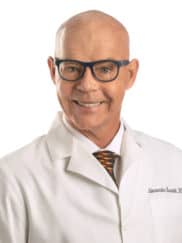No Pain, No Recovery Time, No Scar after New Hysterectomy Surgery
| Jackie Jones has had surgery before, so she thought she knew what to expect. But when Alexander F. Burnett, M.D., performed her hysterectomy as part of her endometrial cancer treatment, Jones was shocked.
“I almost accused him of not doing anything,” said Jones, 67, of Cabot.
There was no pain. No scar. She was able to immediately resume normal activities, only advised to avoid heavy lifting.
“I did everything. I even cooked supper the first night I was home,” Jones said. “I’m still floored that there was no pain. I’m still floored that I could get up and walk. I was scared to get out of bed, but then I walked right out of there without needing the wheelchair.”
Burnett is a gynecologic surgeon who sees patients in the Gynecologic Cancer Clinic, part of the UAMS Winthrop P. Rockefeller Cancer Institute.
He is one of only a handful of surgeons worldwide and the first in the United States to perform a Total Vaginal Natural Orifice Transluminal Endoscopic Surgery hysterectomy.
Traditionally, hysterectomies are performed via an incision to the abdomen, which requires a hospital stay of one or two days and a recovery period of a full six weeks before the patient can resume normal activities and physical exertion. Plus, the surgery leaves a scar.
To avoid these issues, surgeons have long sought alternative methods. Hysterectomy can be performed laparoscopically, using small incisions in the abdomen and lighted cameras. Burnett said the V-NOTES approach takes that idea a step further.
“With V-NOTES, the surgery is actually performed through the vaginal canal, so there are no incisions to the outside of the body that are visible after the surgery,” Burnett said. “I use a device called a laparoscopic port that covers the vagina. I am able to inflate the abdominal cavity with air, then place my surgical instruments and a lighted camera through the port. Once that’s in place, I am able to see and do everything I would normally be able to do with a laparoscopic hysterectomy.”
To learn to do the surgery, Burnett trained directly with Jan Baekelandt, M.D., a surgeon in Belgium who invented the approach and has completed over 1,000 cases. Burnett has completed over 100 V-NOTES procedures and all have been successful.
“I never took a single pain pill after leaving the recovery room,” Jones said.
Since the surgery, Jones has learned that her cancer was stage Ia, but Burnett believes the total hysterectomy will be the extent of her treatment. She is not scheduled for chemotherapy or radiation, but will return for exams every four months for two years to make sure her cancer doesn’t come back or spread.
In the meantime, Jones, a retired mortgage loan originator who lived in Romance for many years before moving to Cabot, is back to her routine: cracking jokes, giving her husband a hard time, doting on her 14-year-old granddaughter, and making people smile.
Now when she looks back at her decision to follow her longtime gynecologist’s advice and seek treatment with Burnett, she is glad she went out of her comfort zone to see someone new, even during a nerve-racking time like a cancer diagnosis.
“I didn’t know what to expect,” Jones said. “But she suggested that I go see Dr. Burnett, that she felt like he was an expert, someone she would want to go to herself.”
Jones is glad she did, and is also glad to be part of cutting-edge science like the V-NOTES procedure.
“A lot of people are scared of ‘new,’” Jones said. “So would I recommend it? Yes. Would I recommend him? Yes. Highly. Your mind has to be open to something new.”

